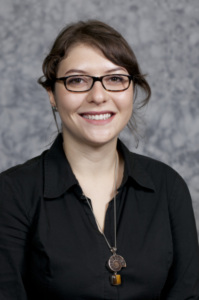
Eileen Dorfman, a student at University Wisconsin Law School, is one of the 14 law students chosen by FASPE (Fellowships at Auschwitz for the Study of Professional Ethics) to participate in a two-week program in New York, Germany, and Poland in May 2013. This trip uses the history of the Holocaust as a way to engage students in an intensive study of contemporary ethics in their field.
FASPE fellowships examine the roles played by professionals in four specific fields (journalism, law, clergy, and medicine) in Nazi Germany and underscore that moral codes governing these key professions can break down or be distorted with devastating consequences. By educating students about the causes of the Holocaust and promoting their awareness of related contemporary issues, FASPE seeks to prepare these Fellows to address various ethical issues facing their professions in the present day.
The 2013 program will be led by Eric Muller, Dan K. Moore Distinguished Professor in Jurisprudence and Ethics at the University of North Carolina School of Law, and Lisa Lerman, Professor of Law and Coordinator of Clinical Programs at The Catholic University of America.
Ms. Dorfman, now in her first year of law school, hopes to learn how to “apply the lessons of the Fellowship to present-day issues, so that I can better recognize measures that might be taken to prevent similar occurrences in the future.” She hopes to become a “better-rounded, more conscientious attorney.” Lawyers face an obligation to “not only represent the best interests of their clients, but also remain mindful of ethical obligations to their profession, their communities, and the public good.”
Ms. Dorfman and the other FASPE Law Fellows will begin orientation at the Museum of Jewish Heritage—A Living Memorial to the Holocaust in New York City on May 26. They will be traveling with a similar group of FASPE Journalism Fellows. Orientation will include visiting the Museum’s exhibits, meeting with Holocaust survivors, and working with FASPE staff and guest scholars. The European portion will include visits to Berlin and Nuremberg, where Fellows will have the opportunity to study historical and cultural sites. Educational workshops will be held at places such as the House of the Wannsee Conference, the site where representatives of State and Nazi Party agencies convened in 1942 to discuss and coordinate plans for the “Final Solution,” and the Memorium Nuremberg Trials, the site of the post-war Nuremberg trials. The Fellows will also travel to Oświęcim, Poland, the town the Germans called Auschwitz, where they will work with the distinguished educational staff at the Auschwitz-Birkenau State Museum.
About FASPE
FASPE’s innovative programs for students in these four disciplines address contemporary ethical issues through a unique historical context. FASPE is predicated upon the power of place, and in particular the first-hand experience of visiting Auschwitz and traveling through Germany and Poland where Fellows study the past and consider how to apply the lessons of history as they confront the ethical challenges of their profession.
FASPE works under the auspices of the Museum of Jewish Heritage—A Living Memorial to the Holocaust and in cooperation with the Haus der Wannsee-Konferenz, Berlin and the Auschwitz-Birkenau State Museum, Oświęcim, Poland. For more information about topics the students will study and to view a video about FASPE, visit www.mjhnyc.org/faspe.
Submitted by Law School News on April 10, 2013
This article appears in the categories: Articles